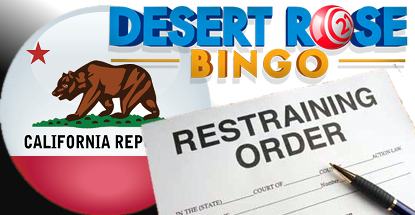 California’s attorney general Kamala Harris has asked a federal court for a temporary restraining order and preliminary and permanent injunctions against the Iipay Nation of Santa Ysabel’s real-money online bingo site. The federally recognized tribe, located in San Diego County, made waves this summer with the launch of its free-play poker PrivateTable.com site. The tribe kept promising to launch a real-money version but always backed off at the last minute. Then, in a surprise move, the tribe launched the real-money Desert Rose Bingo earlier this month in combination with interactive gaming firm Great Luck LLC.
California’s attorney general Kamala Harris has asked a federal court for a temporary restraining order and preliminary and permanent injunctions against the Iipay Nation of Santa Ysabel’s real-money online bingo site. The federally recognized tribe, located in San Diego County, made waves this summer with the launch of its free-play poker PrivateTable.com site. The tribe kept promising to launch a real-money version but always backed off at the last minute. Then, in a surprise move, the tribe launched the real-money Desert Rose Bingo earlier this month in combination with interactive gaming firm Great Luck LLC.
The attorney general’s paperwork (Turtletalk obtained both the TRO motion and complaint) says the tribe’s bingo offering violates state and federal law, including the Unlawful Internet Gambling Enforcement Act (UIGEA). The AG claims the site also doesn’t comply with the Indian Gaming Regulatory Act (IGRA) and materially breaches the tribal-state gaming compact Santa Ysabel inked with the state in 2003. The tribe operated the Santa Ysabel Resort and Casino on its tribal lands until it filed for bankruptcy in 2012, citing some $50m in debts. The casino shut down permanently in February of this year.
The state says Desert Rose is an “electronic facsimile of bingo” and thus amounts to Class III gaming not expressly authorized by the compact. The tribe maintains that bingo is Class II gaming, which the compact allows.
The attorney general argues that Desert Rose doesn’t utilize geo-location technology to limit play to within Santa Ysabel’s tribal lands. As proof, the state’s investigators opened a Desert Rose account and played some bingo while not on the tribe’s property. The state sums up its argument as follows: “The Tribe is reaching out to Californians irrespective of whether they are on its Indian lands. IGRA does not allow this. The UIGEA does not allow this. The Compact does not allow this.”
The state notes that UIGEA allows tribal online gambling only if bets or wagers are initiated and received exclusively “within the Indian lands” of a specific tribe. The UIGEA also requires the tribe to employ age-verification and geo-location technology “reasonably designed to block access to minors and persons located outside of the applicable Tribal lands.” Suffice it to say, the state has a poor impression of the Desert Rose site’s capabilities in these areas.
The Desert Rose site has attempted to address these concerns by utilizing virtual private network (VPN) technology, a scheme they insist doesn’t violate IGRA. Santa Ysabel maintains that the use of proxy play technology means “at no time is live bingo game action performed by the user. This ensures that all game play takes place on tribal lands.”
The state says it contacted the tribe in July, shortly after it first announced its real-money online intentions but the tribe rejected a request to meet and confer on the subject. The state says the tribe also said it planned to offer only online poker, not bingo. The state has given the tribe 60 days in which to “cure its breach” of the compact it signed.
The state’s filing was expected and, whatever the outcome, may finally bring some legal clarity to these issues, which have heretofore been relegated to press releases and spirited debates in the cocktail areas of gaming industry conferences. Judge Anthony J. Battaglia is slated to hear the case on Thursday, Dec. 4.
